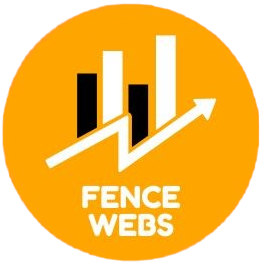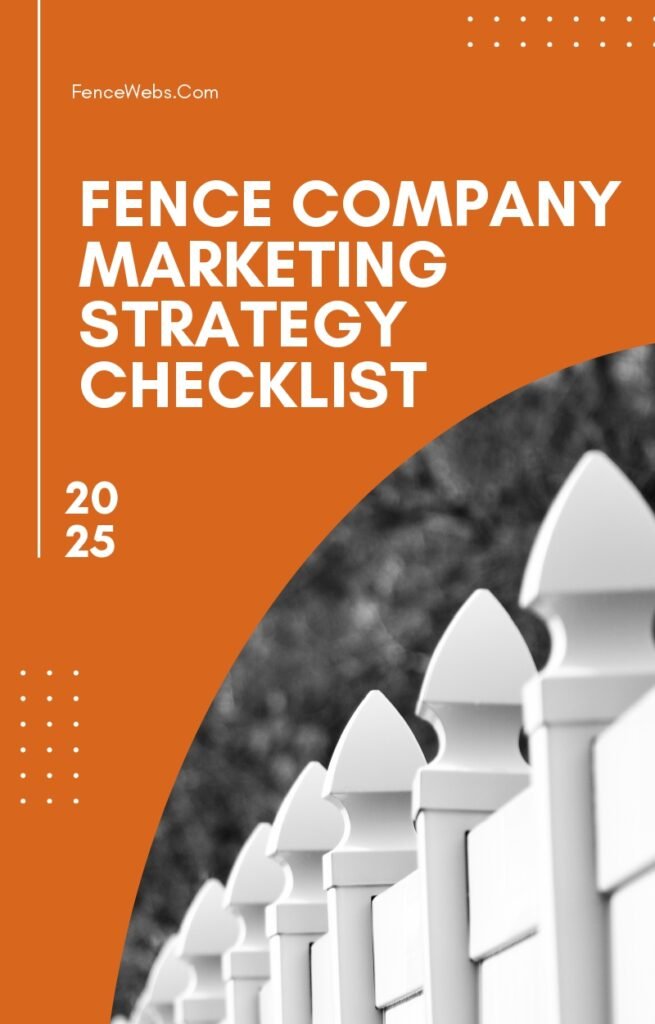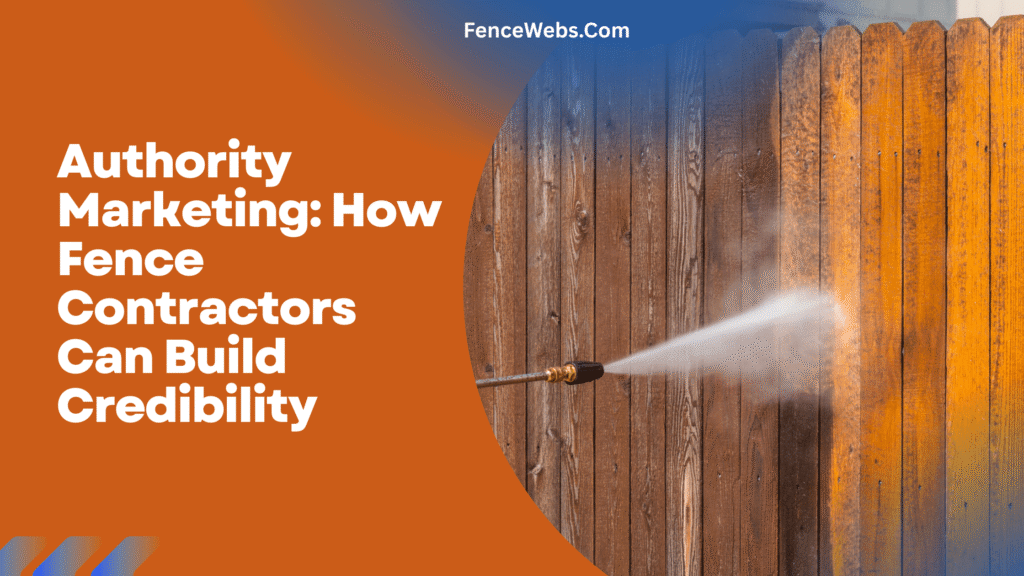Why This Stuff Still Works
Let’s be real. SEO gets talked about so much that it can feel like a scam. But it still works, especially for local businesses.
People still go to Google when they need help. If someone needs a fence repaired, they search for it. If your website doesn’t include the words they’re typing, you probably won’t show up.
Google isn’t magic. It still needs you to use the right words. This guide gives you those words, real ones people search for every day.
Who This Is For
This is for fence contractors, small crews, and local companies trying to get more leads without throwing money at ads. You don’t need to be an SEO expert. You just need to know what your customers are typing and where to use it.
We’ll give you the keywords and show you how to make them work. No fluff. Just useful stuff.
A Quick Note Before We Start
Using keywords doesn’t mean stuffing a bunch of terms onto a page. That doesn’t work anymore.
You need to use the right words in the right places, your homepage, service pages, blog posts, Google Business Profile, and even photo captions. That’s how people find you.
Let’s start with the basics.
1. Service-Based Keywords
These are your core services, what people type when they know what they need.
Examples (Monthly US Search Volume):
- fence installation – 6K–10K
- fence repair near me – 3K–5K
- fence contractor – 1.5K–2.5K
- fence builder – 1K–2K
- fence replacement cost – 600–1K
- fence removal service – 300–600
- emergency fence repair – 200–400
- fence post repair – 800–1.2K
- new fence install – 300–500
- fence gate repair – 700–1K
- install privacy fence – 900–1.4K
- rebuild old fence – 250–450
- fence staining and sealing – 150–300
- fence power washing service – 100–250
- fence inspection company – 150–300
- same-day fence service – 90–150
- residential fence installation – 400–800
- fence for rental properties – 80–120
- backyard fence contractors – 300–500
- fence demo and rebuild – 100–200
Use these on your main service pages, quote request forms, and any section where you’re talking about what you offer.
2. Material-Based Keywords
People often search based on what the fence is made of. Some want the classic wood look. Others want something low-maintenance like vinyl.
Examples (Monthly US Search Volume):
- wood fence builder – 2K–3.5K
- install cedar fence – 600–900
- pressure-treated wood fencing – 300–500
- redwood fence company – 250–400
- vinyl fence installation – 4K–6K
- white vinyl fence installer – 400–700
- chain link fence contractor – 2.5K–3.5K
- galvanized chain link fencing – 150–300
- black chain link fence for yard – 500–800
- aluminum fence installers – 1.2K–1.8K
- aluminum pool fencing – 200–400
- wrought iron fence repair – 300–500
- steel privacy fence – 120–200
- composite fence installer – 300–600
- bamboo fence installation – 100–250
- modern metal fence styles – 200–300
- vinyl privacy fence near me – 1K–1.5K
- split rail fencing company – 100–200
- lattice top fence installation – 80–160
- corrugated metal fence builder – 100–200
These work well on gallery pages, project pages, and blog posts where you’re comparing materials or showing off past jobs.
3. Local (Geo) Keywords
Most fence jobs are local. So your keywords should include cities, neighborhoods, ZIP codes, or even nearby landmarks.
Examples (Monthly US Search Volume):
- fence company [your city] – 2K–3.5K
- best fence installer in [town] – 800–1.2K
- [neighborhood] fence contractor – 300–600
- local fence companies near me – 2.5K–4K
- [ZIP code] fence builder – 600–900
- top-rated fencing [city name] – 300–500
- fence repair [region name] – 400–700
- fence quotes in [county] – 200–400
- affordable fence company [city] – 500–900
- chain link fence [your suburb] – 300–500
- driveway gate installation [local area] – 200–300
- fencing pros [your city] – 150–250
- emergency fence repair [town name] – 1K–2K
- fence builders [city + state] – 500–700
- fence contractor near downtown [city] – 250–400
- residential fence [neighborhood name] – 100–200
- small town fence repair [town name] – 300–500
- same-day fence quotes [ZIP code] – 600–1K
- backyard fence [your area] – 1.5K–2K
- vinyl fencing in [metro area] – 700–1.2K
Use these in your homepage footer, Google Business Profile, service area page, and even blog posts with local project highlights.
4. Fence Type or Purpose Keywords
Sometimes people search by what the fence is for. Not what it’s made of, but what it’s supposed to do.
Examples (Monthly US Search Volume):
- privacy fence installers – 2.5K–3.5K
- backyard privacy fence builder – 1K–1.8K
- dog fence company – 600–1K
- pet fence for large dogs – 500–800
- pool safety fence installation – 300–600
- baby-safe fencing around pool – 100–300
- front yard fence company – 400–600
- garden fence ideas – 3K–5K
- deer fence installation – 200–400
- security fencing for homes – 500–800
- ranch fence contractor – 400–700
- commercial fencing services – 250–500
- barbed wire fence company – 120–250
- fence for sloped yards – 150–300
- horizontal privacy fence contractor – 200–300
- modern fence for backyard – 100–200
- HOA-approved fence company – 180–250
- decorative wood fence installers – 90–160
- gate and fence combos – 300–500
- small yard fence solutions – 300–500
These make great blog post topics, FAQ items, or project pages with photos and before/after examples.
5. Intent-Based Keywords
Some people are ready to hire. Others are just looking around. Knowing which is which helps you decide what to say.
Buyer Intent (Monthly US Search Volume):
- hire fence builder near me – 3.5K–5K
- fence quote [city name] – 1K–1.5K
- fencing estimate [your ZIP] – 800–1.2K
- book fence installation – 1K–1.5K
- local fencing services – 900–1.3K
- install new fence this week – 400–800
- fence companies taking jobs now – 150–300
- get backyard fence quote – 500–700
- fast fence repair in [town] – 250–400
- find fence company near me – 2K–3K
Research Intent (Monthly US Search Volume):
- how much does a fence cost – 6K–10K
- cheapest fence types – 2K–3K
- vinyl vs wood fence – 4K–6K
- best fence for dogs – 3K–4.5K
- how long does a wood fence last – 800–1.2K
- is chain link cheaper than wood – 300–600
- what type of fence is easiest to maintain – 1K–1.8K
- fence ideas for front yards – 1.2K–2K
- should I stain a new fence – 400–800
- fence height rules for backyards – 300–600
Use buying keywords on your sales pages and quote forms. Use research keywords for blog posts, YouTube titles, or FAQ pages.
6. Price & Cost Keywords
Money matters. People want to know how much a fence is going to cost before they call. These searches come from serious buyers trying to plan their budget. Use these keywords on pricing pages, service quotes, blog posts, or FAQ sections.
Examples (Monthly US Search Volume):
- how much does a fence cost – 6K–10K
- fence installation cost – 4K–6K
- fence cost per foot – 3.5K–5K
- vinyl fence cost – 2.5K–4K
- chain link fence cost per foot – 2K–3K
- wood fence pricing – 1.5K–2.5K
- privacy fence cost calculator – 1K–1.5K
- fence replacement cost estimate – 900–1.3K
- how much does a wood fence cost – 1.2K–2K
- average cost to install a fence – 2K–3K
If you don’t already have a page that explains pricing, you should. Even if you can’t list exact numbers, talk about what affects the cost, length, material, terrain, permits, etc.
7. Seasonal Keywords
Fence work is seasonal in many areas. Weather, temperature, and homeowner schedules all play a part. These searches spike around spring and summer, and drop off in colder months, unless you’re in warmer states where demand holds steady.
Examples (Monthly US Search Volume):
- best time to install a fence – 1K–1.5K
- spring fence installation – 500–900
- schedule fence project before summer – 250–400
- winter fence repair service – 100–250
- fall fence maintenance – 300–500
- fence installation before winter – 150–300
- summer fencing specials – 200–400
- pre-winter fence inspection – 90–180
- seasonal fence deals – 250–350
- install fence before rainy season – 120–200
These make great blog post ideas (“Why Fall Is the Best Time for Fence Repairs”), social media topics, or limited-time service pages (“Spring Fence Booking Now Open”).
8. DIY & Educational Keywords
Some people want to build their own fence. That doesn’t mean they’re not your customer. Many end up calling a pro halfway through. Others just want to learn before they hire. These searches are high-volume and perfect for blogs, how-to pages, or YouTube videos.
Examples (Monthly US Search Volume):
- how to build a fence – 10K–15K
- DIY wood fence – 2K–3K
- install fence posts yourself – 1.5K–2.5K
- how deep should fence posts be – 3K–4.5K
- how to stretch chain link fence – 1.2K–2K
- best tools for fence building – 800–1.5K
- how to level fence posts – 900–1.4K
- common DIY fence mistakes – 600–1K
- should I install my own fence – 1K–1.5K
- is DIY fencing worth it – 700–1.2K
Create helpful content here, not just to rank, but to build trust. You might even win over the homeowner who tried and gave up.
9. Problem & Pain Point Keywords
These are the “help me now” searches. Someone’s fence broke. The dog keeps escaping. The HOA is breathing down their neck. These aren’t tire-kickers. They’re frustrated and looking for answers.
You should have pages or blog posts ready to catch them.
Examples (Monthly US Search Volume):
- broken fence repair near me – 2K–3K
- dog keeps getting through fence – 1.5K–2K
- neighbor’s fence is leaning – 1.2K–1.8K
- fence not meeting city code – 500–900
- HOA fence violation letter – 300–700
- gate won’t close all the way – 800–1.3K
- wood fence rotting at bottom – 1K–1.5K
- posts keep leaning after rain – 400–700
- my fence is falling over – 1K–1.8K
- how to fix sagging gate – 2K–3.5K
Use these for FAQ pages, blog posts, or even landing pages for your repair service. You can even include these in photo captions or customer case studies.
10. Visual, Design & Idea-Based Keywords
These are the fun ones. People search for looks before they search for labor. This traffic is more top-of-funnel, people who are curious, browsing, or planning, but they’re often future buyers.
Examples (Monthly US Search Volume):
- modern fence ideas – 4K–6K
- fence design for backyard – 3K–4.5K
- best backyard fence styles – 2K–3K
- unique fence ideas – 1.5K–2.5K
- cheap fence ideas for privacy – 5K–7K
- garden fence design photos – 2K–3.5K
- horizontal vs vertical fence boards – 900–1.4K
- fence color ideas – 1.2K–1.8K
- fence lighting ideas – 700–1.2K
- fence with planter boxes – 600–1K
These are gold for Pinterest-style blog posts, project portfolios, or “style guide” pages on your site. They can drive traffic even before someone is ready to call.
11. Competitor & Brand-Related Keywords
Like it or not, people compare. They search for big-box stores, national chains, or brand names, and sometimes they search you by name too. These keywords are great for competitor comparison pages or when you want to catch someone who’s still deciding.
Examples (Monthly US Search Volume):
- Home Depot fence installation – 10K–15K
- Lowes fence installation – 6K–9K
- local fence company vs Home Depot – 1.5K–2.5K
- fence installation near me reviews – 2K–3K
- best fence company in [city] – 3K–5K
- fence contractor reviews – 1.2K–1.8K
- is Lowes fencing good quality – 900–1.3K
- Home Depot vs local fence installer – 1K–1.5K
- fence company with payment plans – 500–900
- Trex fencing vs wood – 1.2K–2K
These are strong keywords to target with blog posts or landing pages comparing your services to big-box options. Be fair and honest, don’t bash the competition, just show what you do better.
12. Voice Search & Conversational Keywords
More and more searches now sound like actual questions. These often come from phones or voice assistants (Alexa, Siri, Google). They’re longer but have clear intent, great for FAQs and blog posts.
Examples (Monthly US Search Volume):
- who installs fences near me – 2.5K–4K
- what’s the cheapest type of fence – 1.5K–2.5K
- how long does it take to install a fence – 1K–1.8K
- should I repair or replace my fence – 800–1.3K
- how do I get a fence permit – 1K–1.5K
- can I build a fence on my property line – 1.5K–2K
- do I need my neighbor’s permission to put up a fence – 2K–3K
- how tall can a backyard fence be – 2.5K–3.5K
- how much does a fence cost per foot installed – 2K–3K
- who has the best fence warranty – 900–1.4K
These are great to use in blog post titles, FAQ sections, or even as headings on your service pages. If you answer the question clearly, you’ve got a shot at being featured in Google’s “People Also Ask” box.
13. Long-Tail Blog & Content Keywords
These are niche keywords, but they work well for blogs, YouTube videos, and info-based content. They won’t always bring buyers right away, but they build trust and keep people on your site.
Examples (Monthly US Search Volume):
- how to fix a leaning fence post without digging – 900–1.4K
- privacy fence ideas for sloped yards – 1K–1.5K
- how to build a fence without concrete – 1.5K–2.2K
- cheap backyard fencing for renters – 800–1.2K
- how to stain a new fence the right way – 1.2K–1.8K
- vinyl fence that looks like wood – 1K–1.6K
- how to prevent rot in wood fencing – 900–1.3K
- can I install a fence in winter – 700–1.1K
- low-maintenance fences for busy homeowners – 600–1K
- how to keep weeds out of fence line – 1.2K–1.7K
Write helpful content, and make it real. Don’t just repeat keywords, give answers, share examples, and add photos when you can. People remember that.
How to Use These Keywords Without Sounding Weird
Here’s the truth: SEO doesn’t work if your site reads like a robot wrote it. That’s why you need to work keywords into your site naturally.
Here are some places where keywords actually help, without making your content awkward:
Where to use keywords:
- Main headline (H1): “Affordable Vinyl Fence Installation in Tulsa”
- Page title + meta description: Write for people, not bots
- Subheadings (H2/H3): Use question-style keywords to break up text
- Service descriptions: Mention fence types, materials, and your city
- Photo captions: Describe what’s in the image using the keyword
- Google Business Profile updates: Sprinkle in a few local keywords
- Blog post intros and conclusions: Restate the search term naturally
- FAQ sections: Voice-style questions work well here
- Alt-text for images: Helps both SEO and accessibility
What you don’t want is keyword stuffing. That’s when you cram too many phrases into one spot. Google doesn’t like it. Readers hate it more.
Instead of saying:
“Fence company in Dallas offering fence installation in Dallas with best Dallas fence prices.”
Say:
“We install all types of fences for homeowners across Dallas, from vinyl and wood to chain link. Whether you need a new install or a quick repair, we can help.”
Simple. Natural. Still uses the keywords.
Final Thoughts
You now have more than 100 fence SEO keyword ideas, broken into categories that match how real people search:
- Services
- Materials
- Locations
- Fence types
- Buyer intent
- Price and cost
- Seasonal trends
- DIY and blog content
- Problems and pain points
- Voice-style questions
- Competitor comparisons
And not just the keywords, the estimated monthly search volume in the U.S. is here too, so you know which ones matter most.
This isn’t just a list. It’s a strategy. You can use it to build pages, write blog posts, plan videos, and even organize your Google Business Profile.
Need help writing content that uses these right?
Let me know, I can help map out blog topics, write your pages, or even audit your site’s SEO.
Or if you’re ready to go solo: grab the list, bookmark this guide, and start plugging these into your website one at a time.
Done right, these keywords will bring you more calls, from people already looking for what you offer.








